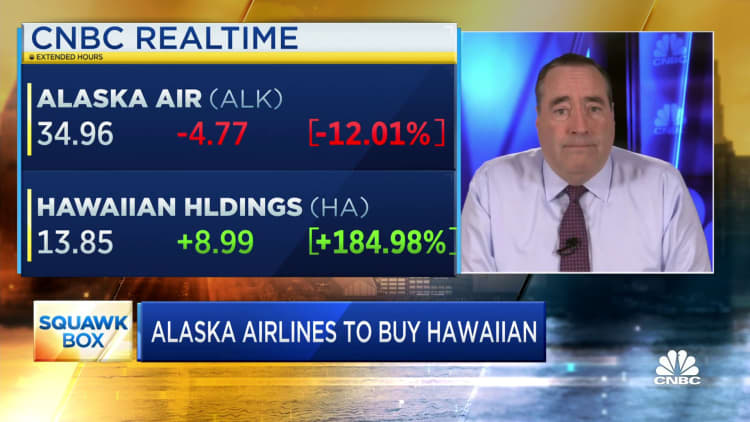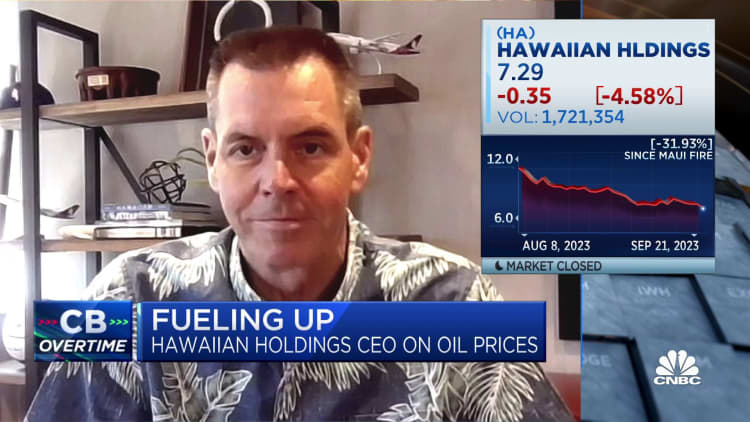[ad_1]

Alaska Air Group has agreed to buy rival Hawaiian Airlines in a $1.9 billion deal, setting up another potential regulatory battle in the second proposed airline merger in less than two years.
Alaska would pay $18 a share for Hawaiian and would take on $900 million of its debt, the companies said Sunday. Shares of Hawaiian Airlines closed on Friday at $4.86, giving the company a market capitalization of about $250 million. They’re down nearly 53% this year.
The airline has struggled with challenges including the Maui wildfires, increased competition from Southwest Airlines, which has ramped up service in Hawaii in recent years, and a lagging recovery of travel to and from Asia after the pandemic. Hawaiian has posted net losses in all but one quarter since the start of 2020, while Alaska and other carriers have returned to more solid financial footing as the pandemic waned.
“What we saw here was a unique opportunity in time at the valuation that we saw Hawaiian at,” said Shane Tackett, Alaska Airlines’ CFO, in an interview. He said the deal would also enable the combined companies to become a “market leader” in the premium-travel Hawaii market.
Hawaiian’s stock was up 180% in morning trading on Monday at $13.57 a share, though still below the proposed purchase price. Alaska’s shares were down 17% in morning trading.
Regulatory hurdles
Carriers have faced strong opposition from President Joe Biden’s Justice Department when they have argued that they need to pair up to better compete with larger rivals. Earlier this year, the Justice Department won a lawsuit to break up a regional partnership in the Northeast between JetBlue Airways and American Airlines.
The Justice Departments also sued to block JetBlue Airways‘ proposed acquisition of discount carrier Spirit Airlines. A trial is expected to wrap up in the coming days.
Four airlines — American, United, Delta and Southwest — control about 80% of the U.S. market, consolidation that resulted from years of mergers.
Hawaiian and Alaska said they expect the transaction to close in 12 to 18 months, subject to approval by regulators and Hawaiian’s shareholders.
On a call with analysts on Sunday evening, Alaska CEO Ben Minicucci expressed confidence that the deal will get approved, citing 12 overlapping markets, a combined 1,400 daily flights and a larger network that he said would allow the airline to compete with the four largest carriers.
“We are hopeful that it will be seen in a positive light,” he said.
The Association of Flight Attendants-CWA, which represents cabin crews at both airlines said it would evaluate the deal.
“Our first priority is to determine whether this merger will improve conditions for Flight Attendants just like the benefits the companies have described for shareholders and consumers,” the AFA said in a statement. “Our support of the merger will depend on this.”
The combined company will be based in Seattle, where Alaska Airlines is headquartered, and be led by Minicucci.
“Given the transaction dollars we paid we feel this is strategically a step-change for us to accelerate not only our financial performance but the growth of our network,” he said said on the call.
Shift for Alaska
The two airlines said they will keep each carrier’s brand but operate under a single platform, combining into a 365-airplane fleet covering 138 destinations.
Prior to pursuing Hawaiian, Alaska Airlines acquired Virgin America for $2.6 billion in 2016.
The Hawaiian deal is a major shift for Alaska. It operates Boeing 737s and it spent years whittling down Virgin’s fleet of Airbus planes to streamline its fleet. Purchasing Hawaiian would bring a complex mix of Boeing and Airbus jets, both narrow-body and wide-body planes, under Alaska’s roof.
“The Hawaiian brand will remain an important part of our home state with Honolulu becoming a strategic hub for the combined company and expanded service for Hawaii residents,” Hawaiian CEO Peter Ingram said on the call Sunday.
The combination will allow Alaska Airlines to triple nonstop or one-stop flights from the Hawaiian islands to destinations throughout North America. It will also bring Hawaiian’s long-haul flying to and from Asia under Alaska’s umbrella. Hawaiian last year struck a deal to fly converted-cargo planes for Amazon.
Alaska Airlines said the deal should bolster earnings within the next two years with at least $235 million of “run-rate synergies.”
WATCH: Maui tourism still not back to full strength since wildfires

